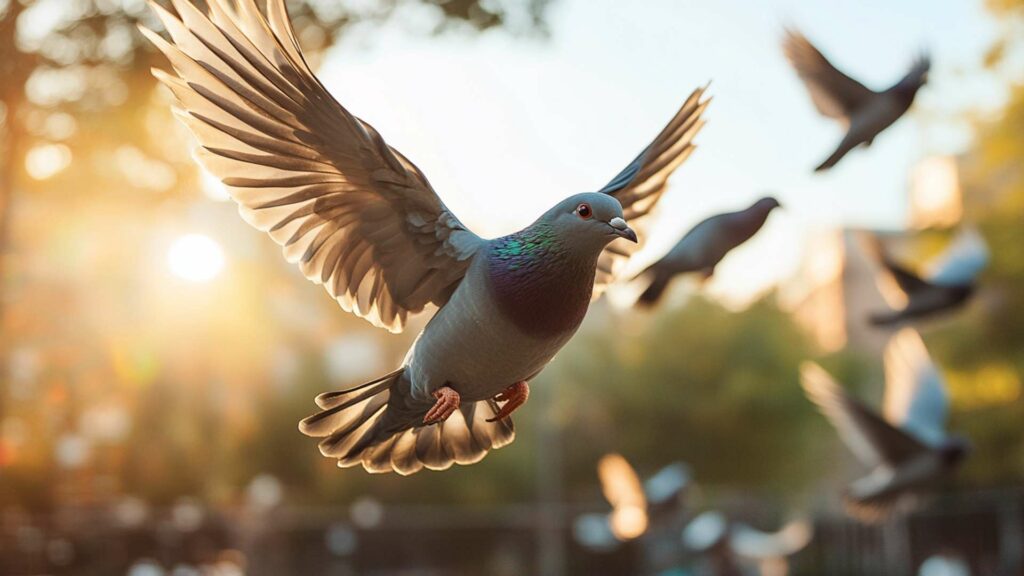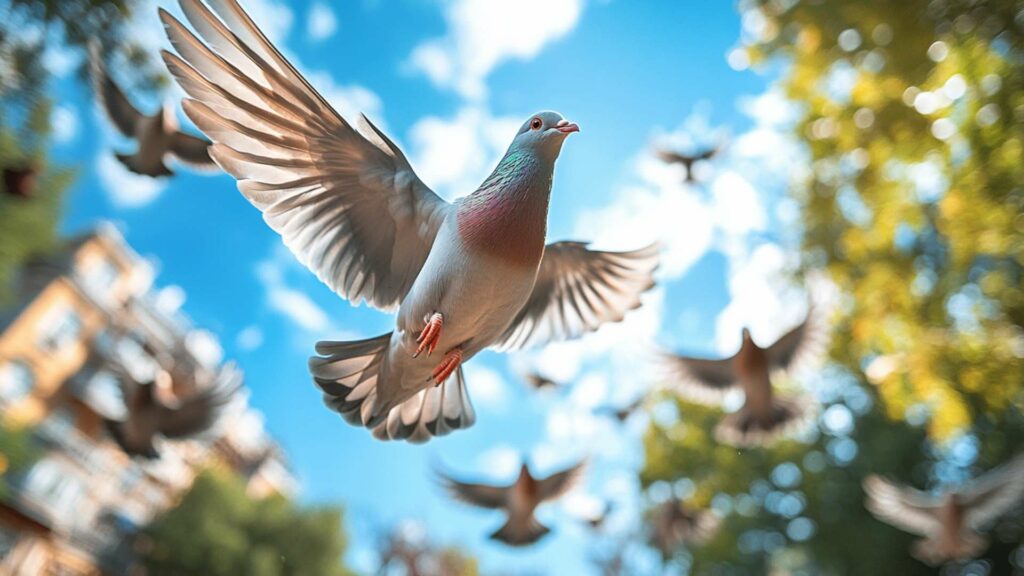Have you ever been woken up by the incessant cooing and fluttering of pigeons outside your window? It’s an annoyance that can disrupt even the most peaceful sleep. These pesky creatures seem to have a knack for finding the perfect roosting spots near human settlements, nesting pigeons often choosing our homes as their preferred resting places.
The importance of finding effective solutions to keep pigeons away while sleeping cannot be overstated. Not only do these birds disturb our much-needed rest, but they also leave behind a mess that requires tedious cleaning.
Their droppings can damage property, deface exteriors, and carry diseases. Furthermore, the constant presence of pigeons can attract other pests, creating an entirely new set of problems.
The Annoyance of Pigeons Disturbing Sleep

Pigeons are notorious for their cooing calls that echo through the quiet hours of the night. Their sounds can range from gentle coos to raucous squawks, depending on their mood and level of agitation. The noise they generate is enough to jolt anyone out of a peaceful slumber.
And let’s not forget about the mess they create! Pigeon droppings are not only unsightly but also acidic and corrosive.
If left unchecked, these droppings can cause damage to roofs, cars, balconies, and anything else unlucky enough to be in their trajectory. Cleaning up after them becomes a never-ending chore that takes precious time away from more enjoyable activities.
The Importance of Finding Effective Solutions

To prevent pigeons from disturbing our sleep and wreaking havoc on our surroundings, it is crucial to find effective methods that deter them from roosting near our homes. Ignoring this issue will only exacerbate the whole pigeon problem, and lead to increased frustration and potential damage.
By taking proactive measures to discourage pigeons from settling in our sleeping areas, we can reclaim our peace and ensure a restful night’s sleep. Additionally, finding effective solutions is not only beneficial for us but also for the pigeons themselves.
Encouraging them to seek alternate roosting areas away from human habitation is safer for them, as they are less likely to encounter harmful situations or predators. Over the next few sections, we will explore various methods that can help us prevent pigeons from disrupting our sleep.
From natural deterrents and physical barriers to technological solutions and humane methods, there are options available for every situation. So, let’s dive in and discover how we can bid these feathered intruders farewell once and for all!
Understanding Pigeon Behavior

Pigeon roosting habits and preferences
Pigeons, those ubiquitous and often charming birds, have a strong instinct to roost in elevated areas that provide shelter and safety. They commonly seek out ledges, rooftops, and even tree branches to settle down for the night.
Pigeons are social creatures that prefer to roost in large groups or pairs; they find comfort and security in numbers. Furthermore, they tend to favor flat surfaces as opposed to sloped ones as it offers stability while they sleep.
Why pigeons are attracted to sleeping areas
Pigeons may have a reputation for being dirty birds, but their attraction to sleeping areas stems from practical reasons rather than a desire for mischief. The primary allure feed pigeons lies in the availability of food sources nearby. Pigeons are opportunistic feeders who rely on human activities for sustenance.
Residential and commercial properties often offer abundant food options such as discarded pet food or crumbs left behind by outdoor dining establishments. Besides the presence of food, pigeons also appreciate sleeping areas with adequate protection from predators.
This is why buildings with overhangs or architectural features that provide shelter become enticing roosting spots. Additionally, pigeons are known for their adaptability and can thrive in urban environments where they have adapted to nesting on man-made structures like solar panels or cling onto different roofing materials.
It is worth noting that the pigeon nests and droppings can be more than just an unsightly nuisance; they also pose health risks due to the potential transmission of diseases like histoplasmosis and cryptococcosis through fungal spores found in their droppings. Thus, understanding pigeon behavior becomes crucial when seeking effective solutions for keeping them away while you sleep peacefully.
Comprehending pigeon roosting habits is essential if you want to prevent pigeons from turning your sleeping area into their own personal sanctuary. By understanding their preferences for flat surfaces and the factors that attract them, such as the availability of food and shelter, you can implement strategies to deter pigeons effectively.
Now, let’s dive into some practical solutions to address these pigeon problems and ensure a restful night’s sleep.
Scare Tactics: Using Visual and Auditory Deterrents
Hanging Shiny Objects Near Sleeping Area
When it comes to deterring pigeons from roosting near your sleeping area, visual deterrents can be remarkably effective. One simple yet ingenious trick to remove pigeons is to hang shiny objects around the vicinity.
Pigeons are naturally intrigued by reflective surfaces, so by strategically placing items like old CDs, aluminum foil strips, or even wind spinners near their favored roosting spots, you can disrupt their sense of security and discourage them from settling down. The reflection and glimmer created by these shiny objects confuse the pigeons’ eyesight, making it uncomfortable for them to stay in the area.
The constant movement of these reflective surfaces adds an element of disturbance that makes pigeons uneasy. It’s important to note that positioning these items in a way that they catch the sunlight or artificial light source will maximize their effectiveness.
Installing Wind Chimes or Bells to Create Noise

Pigeons are skittish creatures and are easily startled by sudden loud noises. Taking advantage of this instinctual fear can help you scare pigeons and deter them from roosting near your sleeping area. Installing wind chimes or bells in close proximity will create consistent soft sounds with occasional jingles whenever there’s a breeze.
The gentle tinkling sound produced by these auditory deterrents acts as a constant reminder of potential danger for pigeons. They associate the noise with movement, which triggers their survival instincts and encourages them to seek safer locations away from your sleeping area.
Utilizing Predator Decoys to Scare Away Pigeons

Pigeons have natural predators like owls and hawks that pose a threat to their safety. By strategically placing decoy figures resembling these predators near your nest or sleeping area, you can effectively deter pigeons from settling in.
Fake owls or hawks placed on nearby rooftops or windowsills create an illusion of danger, fooling pigeons into believing that their safety is compromised. The sight of these decoys triggers the pigeons’ instinctual response to flee from potential danger, convincing them to find alternative roosting areas away from your sleep space.
Using Motion-Activated Devices for Added Effectiveness
To enhance the effectiveness of your pigeon scare tactics, consider using motion-activated devices specifically designed to deter pigeons. These devices emit sudden bursts of noise or movement whenever they detect motion in their range. Motion-activated sprinklers, for example, can startle the pesky birds with a surprise jet of water, creating an unpleasant experience and discouraging them from returning.
Similarly, sonic repellers emit high-frequency sounds that are irritating to pigeons but inaudible to humans. When a pigeon comes within range, it encounters discomfort and quickly associates it with your sleeping area, deterring future visits.
By incorporating these natural bird deterrents, into your pigeon control strategy while you sleep peacefully at night, you can effectively prevent birds from disturbing your well-deserved rest without causing them any harm. Remember that consistency and the strategic placement of these scare tactics are key to long-term success in keeping those feathered intruders at bay!
Physical Barriers
Bird netting: an effective solution for larger areas

When it comes to keeping pesky pigeons away while you sleep, bird netting can be a highly effective solution for larger areas such as residential and commercial properties. This method involves installing a mesh-like netting over open spaces to create a physical barrier that prevents pigeons from accessing your sleeping area. The key here is choosing the right type of netting material.
There are various types of bird netting available on the market, so it’s essential to select one that suits your specific needs. Look for durable, high-quality materials that are tightly woven to ensure that the pigeons cannot penetrate or get entangled in the mesh.
Nylon or polyethylene nets are commonly used due to their strength and longevity. These materials also provide UV protection, which helps maintain the integrity of the net even under sunlight exposure.
Proper installation techniques for maximum efficiency
Installing bird netting properly is crucial to maximize its efficiency in keeping pigeons at bay. Begin by measuring the area you want to cover and purchasing an adequate amount of netting material. Ensure that there are no gaps or openings where pigeons could squeeze through by overlapping adjacent sections and securing them tightly with zip ties or clips.
It’s advisable to hire a professional pest control specialist who has experience in installing bird netting if you’re dealing with larger areas or more complex structures such as rooftops. They possess the expertise required to tackle challenging installations and can ensure proper tensioning and anchoring of the nets.
Spikes and wires: preventing pigeons from landing

Another effective physical barrier against pigeons is the use of bird spikes, and wires strategically placed near your sleeping area. Pigeon spikes consist of thin rods made from stainless steel or plastic, attached along ledges or flat surfaces where pigeons typically land or roost.
These spikes make it uncomfortable for the birds to perch, encouraging them to find alternative spots away from your sleeping area. Similarly, you can also use wires or strings stretched across open spaces where pigeons congregate.
These barriers disrupt their flight patterns and prevent them from landing comfortably. Be sure to space the wires close enough together to prevent pigeons from squeezing through while maintaining a sufficient gap to hinder landing.
Installing spikes and wires requires careful placement and spacing. It’s important to note that these methods should be used ethically and only in areas where they won’t pose a danger pest birds or to other birds or animals.
Regular inspection and maintenance are necessary as pigeon removal can occasionally cause the spikes or wires to shift out of place. In section 5, we will explore technological solutions such as ultrasonic devices and motion-activated sprinklers that can further enhance your defense against pigeons while you sleep peacefully at night.
Technological Solutions
Ultrasonic Devices: Emitting High-Frequency Sounds to Deter Pigeons
When it comes to keeping pigeons away while you sleep, one effective technological solution is the use of ultrasonic devices. These nifty gadgets emit high-frequency sounds that are beyond the range of human hearing but highly irritating for pigeons. By creating a sonic environment that disturbs and disorients these pesky birds, ultrasonic devices prove to be an excellent pigeon deterrent.
Understanding how ultrasonic technology works is key in selecting the right device for your needs. These devices produce sound waves at frequencies above 20,000 hertz, which is far beyond what humans can perceive.
However, pigeons have a broader range of hearing and are more sensitive to these high-pitched frequencies. When activated, the ultrasonic device emits sound waves that are unbearable for pigeons but harmless for humans and other animals.
When selecting an ultrasonic device for pigeon control, consider the coverage area and frequency range it offers. Different models cater to varying sizes of spaces and come with adjustable frequency settings.
Make sure to choose a device with appropriate coverage that matches the size of your sleeping area or balcony. Additionally, opt for a device that allows you to adjust its frequency output so you can find the most effective setting against those persistent pigeons.
Water Sprinklers with Motion Sensors: Startling Pigeons with Sudden Bursts of Water
Another ingenious technological solution to deter pigeons while sleeping involves water sprinklers fitted with motion sensors. These innovative devices startle pesky pigeons by releasing sudden bursts of water whenever they detect movement nearby – ensuring peaceful nights without any unwanted avian disturbances. Installing motion-activated sprinkler systems couldn’t be easier!
Simply place them strategically around your sleeping area or balcony where pigeons tend to congregate. When a pigeon triggers the motion sensor, the sprinkler system activates and sprays water in its direction.
This sudden water burst startles the birds, teaching them to associate your sleep space with discomfort and discouraging them from returning. Positioning your sprinklers correctly is crucial for maximum effectiveness.
Identify areas where pigeons frequently land or roost, such as ledges or railings near your sleeping area. Aim the sprinklers in these specific directions to target their usual perching spots directly.
By creating an unpredictable and unwelcome environment for pigeons, you’ll be well on your way to enjoying uninterrupted sleep. Utilizing technological solutions like ultrasonic devices and motion-activated sprinkler systems is an excellent way to prevent pigeons from disturbing your sleep.
While these methods get rid of pigeons may seem high-tech, they are safe for both humans and pigeons alike. So bid farewell to those bothersome birds and say hello to peaceful nights free from the cooing chaos!
Remember that humane pigeon control should always be prioritized over harmful methods that could harm pigeons or other wildlife. With an array of effective technological solutions available today, you can easily create a bird-free zone without causing harm while keeping both residential and commercial properties pigeon-free.
Humane Methods for Pigeon Control

Feeding Stations Away from Sleeping Areas
Pigeons, being creatures of habit, are often attracted to sleeping areas due to the availability of food sources nearby. One effective and humane method to deter pigeons from roosting around your sleeping area is by providing designated feeding stations away from your immediate vicinity.
By doing so, you redirect their attention and create a more appealing alternative location for their daily meals. Identify an area outside of your sleeping zone where you can place bird feeders or scattering birdseed on the ground.
Ensure that the feeding stations are located at least 50 feet away from your sleep area. This distance is crucial in order to draw pigeons away without inadvertently attracting them back towards you.
To avoid unintentionally inviting other pests such as squirrels or raccoons, opt for bird feeders that have deterrent mechanisms specifically designed for larger animals. Additionally, make sure to clean up any spilled seed regularly to prevent the accumulation of food debris that may attract unwanted critters.
Remember that consistency is key when implementing this method. By consistently providing food at designated spots away from your sleeping quarters, you encourage pigeons to form new feeding habits and gradually break their association with roosting near you.
Conclusion
Keeping pigeons away while sleeping requires a combination of methods tailored towards deterring these feathered intruders without causing harm. By understanding pigeon behavior and employing natural deterrents like scare tactics or physical barriers such as spikes and netting, you can effectively keep pigeons nest protect your sleep sanctuary from unwelcome avian visitors.
However, it is essential to approach pigeon control with empathy and consider humane alternatives whenever possible. Creating feeding stations away from sleeping areas helps redirect their attention while eliminating access to food sources near your resting spot.
By implementing these strategies consistently and regularly maintaining cleanliness and upkeep, you can enjoy peaceful nights free from disruptive pigeon disturbances. Remember, with a little effort and the right approach, you can peacefully coexist with these fascinating creatures while ensuring a good night’s sleep for yourself.
Prevent Pigeon Problems with D-Termination: Las Vegas’ Leading Pest Control Solution!

If you’re facing pigeon-related challenges, D-Termination is your solution. Our team of specialists excels in pigeon deterrence and the rejuvenation of cleanliness and integrity in your environment. Bid farewell to pigeons by opting for D-Termination’s highly efficient pest control today!
Reach out to us at 702-919-6310 or visit dtermination.com to schedule your pigeon control service and regain your space from these unwelcome pests.
Frequently Asked Questions:
Keep pigeons away at night by using roosting deterrents like spikes or nets.
Pigeons are often most afraid of loud noises, sudden movements, and predators like hawks.
Pigeons dislike strong scents, reflective objects, and changing environments.
To scare pigeons naturally, use decoys, wind chimes, or motion-activated devices to create disturbances.








